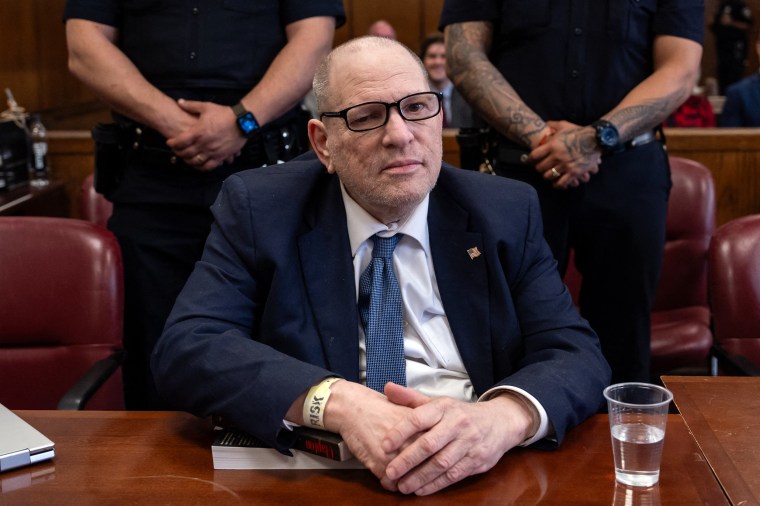Five years ago, Oscar-winning Hollywood mogul Harvey Weinstein was found guilty of third-degree rape following one of the landmark trials of the #MeToo era. He was sentenced to 23 years in prison.
But that was not the end of his legal saga.
In a stunning turn of events last year, Weinstein’s conviction was thrown out by a New York appeals court. The decision paved the way for a new trial, which started this week with jury selection.
Here’s what you need to know about Weinstein’s retrial, and how we got here.
What happened in Weinstein’s first trial?
In late February 2020, a New York jury convicted Weinstein of one count of rape in the third degree of Jessica Mann, a former aspiring actress, and one count of criminal sexual act in the first degree against Mimi Haley, a former “Project Runway” production assistant.
He was found not guilty on two counts of predatory sexual assault and one count of first-degree rape against Mann.
Weinstein had pleaded not guilty and denied all allegations of nonconsensual sex.
The trial was one of the most pivotal episodes of the #MeToo era, a reckoning with sexual misconduct by powerful people in various high-profile industries that began with a wave of allegations against Weinstein in 2017.
In early March 2020, a judge sentenced Weinstein to three years behind bars for third-degree rape and 20 years for first-degree criminal sexual act. The judge ruled that the former producer must serve his sentences consecutively.
Why was Weinstein’s conviction overturned?
In late April 2024, New York’s highest court overturned Weinstein’s 2020 conviction. The court found that the trial judge had improperly allowed testimony against the former Miramax chief based on allegations that were not part of the case.
“We conclude that the trial court erroneously admitted testimony of uncharged, alleged prior sexual acts against persons other than the complainants of the underlying crimes because that testimony served no material non-propensity purpose,” the court said in a 4-3 decision.
Judge Jenny Rivera called the errors “egregious” and said the legal remedy was a new trial.
Weinstein has remained in prison because he was convicted in 2022 of another rape in Los Angeles, and sentenced to 16 years.

What is the focus of Weinstein’s second trial?
Weinstein’s retrial will resemble the original proceedings in certain key ways. He will be retried on charges that he forcibly performed oral sex on Haley, the former “Project Runway” production assistant, in 2006, and raped Mann, the former aspiring actress, in 2013.
But there will be an important addition. Weinstein faces an additional count of first-degree criminal sexual act based on an allegation from an unnamed woman who was not part of the first trial. The woman alleges he forcibly performed oral sex on her in a Manhattan hotel in 2006.
Weinstein has again pleaded not guilty and denied wrongdoing.
What about his health?
In recent years, Weinstein has faced myriad health issues. He has been diagnosed with chronic myeloid leukemia, an uncommon form of bone marrow cancer, two sources told NBC News in October. The sources said he was undergoing treatment at New York’s Rikers Island prison.
This week, a state Supreme Court judge granted Weinstein’s lawyers’ request to have their client transferred from Rikers to Bellevue Hospital. He will be allowed to stay there until his trial is over.
Weinstein’s lawyers had described Rikers in harsh terms, saying he was “consistently mistreated for serious infections, medication is given incorrectly, or not at all, he is experiencing unhealthy and atypical weight gain, and he is forced to endure freezing temperatures while not even being provided clean clothing.”
The former producer underwent emergency heart surgery in September. The procedure was meant to alleviate a significant amount of fluid in his lungs and heart. It came months after he was hospitalized and tested positive for Covid-19 and double pneumonia.
Weinstein, who is usually taken into court in a wheelchair, turned 73 on March 19.
Why was he such a major figure in Hollywood?
Weinstein was one of the towering figures in the American film industry in the 1990s and 2000s. He and his brother, Bob, ran Miramax, the distributor of seminal independent movies like “Sex, Lies, and Videotape,” “The Crying Game,” “Clerks” and “Pulp Fiction.”
He won a best picture Oscar in 1999 as one of the producers of “Shakespeare in Love.” In the early 2010s, Weinstein’s second distribution label, The Weinstein Company, scored back-to-back best picture victories for “The King’s Speech” and “The Artist.”
Weinstein earned a reputation in Hollywood as both a savvy tastemaker and a ruthless operator. He was known for using bare-knuckle tactics in convincing filmmakers to obey his creative edicts and promoting his companies’ films during awards season.
In all, more than 80 women have accused Weinstein of sexual assault or harassment going back decades. He has repeatedly denied the claims, insisting the encounters were consensual.
